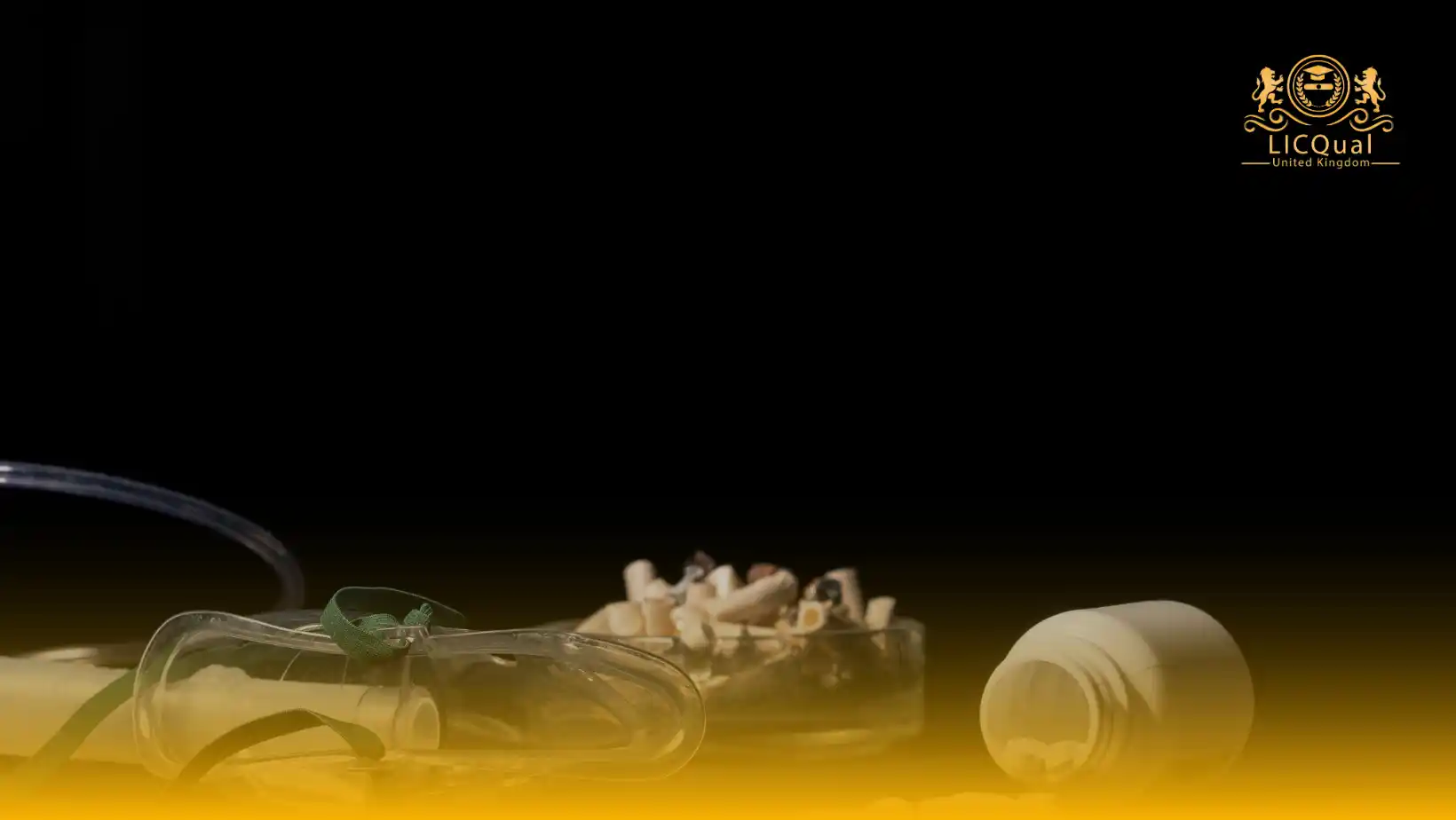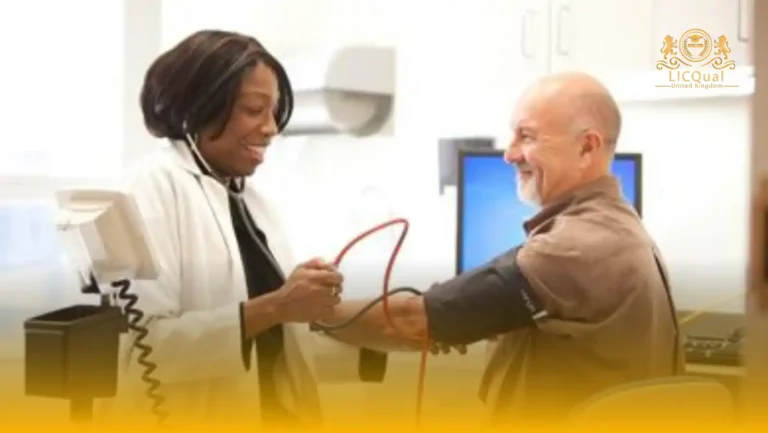The LICQual Level 6 Diploma in Addiction Medicine (Dip AM) is a comprehensive and advanced qualification designed for healthcare professionals, clinicians, and practitioners who aim to deepen their expertise in addiction medicine. This qualification is not intended for fresh candidates; instead, it targets professionals who wish to enhance their career prospects, broaden their knowledge, and strengthen their Continuing Professional Development (CPD).
Learners undertaking this diploma will gain an in-depth understanding of the principles, diagnosis, and management of substance use disorders, including emerging trends and evidence-based treatment strategies. The programme is structured to equip learners with the practical skills and theoretical knowledge necessary to make informed clinical decisions and deliver high-quality care to individuals affected by addiction.
Centres delivering the LICQual Level 6 Diploma in Addiction Medicine are required to maintain the highest standards of training. This includes employing competent and qualified staff, providing access to up-to-date learning materials, and ensuring all necessary resources are available to support learner success. Such robust infrastructure guarantees that learners receive a professional and engaging learning experience, enabling them to confidently apply their skills in real-world clinical settings.
By completing this diploma, learners will not only advance their professional standing but also contribute to improved patient outcomes within their organizations and communities. Whether seeking to expand clinical capabilities or pursue leadership roles in addiction medicine, this qualification provides the expertise and recognition to achieve these objectives.
Course Overview
Qualification Title
LICQual Level 6 Diploma in Addiction Medicine (Dip AM)
Total Units
6
Total Credits
120
GLH
480
Qualification #
LICQ2200945
Qualification Specification
To enroll in the LICQual Level 6 Diploma in Addiction Medicine (Dip AM), applicants must meet the following criteria:
|
Qualification# |
Unit Title |
Credits |
GLH |
|---|---|---|---|
|
LICQ2200945-1 |
Foundations of Addiction Medicine |
20 |
80 |
|
LICQ2200945-2 |
Assessment and Diagnosis of Substance Use Disorders |
20 |
80 |
|
LICQ2200945-3 |
Evidence-Based Treatment and Intervention Strategies |
20 |
80 |
|
LICQ2200945-4 |
Addiction in Special Populations |
20 |
80 |
|
LICQ2200945-5 |
Research, Evaluation, and Evidence-Based Practice |
20 |
80 |
|
LICQ2200945-6 |
Professional Practice and Continuing Development in Addiction Medicine |
20 |
80 |
By the end of this course, learners will be able to:
Unit 1: Foundations of Addiction Medicine
By the end of this unit, learners will be able to:
- Critically evaluate the biological, psychological, and social factors contributing to addiction.
- Analyse global epidemiology and trends in substance use disorders.
- Demonstrate understanding of the neurobiological mechanisms underlying addictive behaviours.
- Assess ethical and legal considerations relevant to professional practice in addiction medicine.
Unit 2: Assessment and Diagnosis of Substance Use Disorders
By the end of this unit, learners will be able to:
- Conduct comprehensive assessments and screenings for substance use disorders.
- Apply international diagnostic criteria (DSM-5, ICD-11) effectively in clinical practice.
- Utilise evidence-based tools to evaluate risk, severity, and impact of addiction.
- Identify and manage comorbid physical and mental health conditions in individuals with addiction.
Unit 3: Evidence-Based Treatment and Intervention Strategies
By the end of this unit, learners will be able to:
- Critically appraise pharmacological and non-pharmacological treatment options for addiction.
- Implement behavioural therapies, counselling techniques, and rehabilitation interventions.
- Apply harm reduction strategies appropriately within clinical and community settings.
- Develop and manage personalised treatment plans tailored to individual learner needs.
Unit 4: Addiction in Special Populations
By the end of this unit, learners will be able to:
- Analyse addiction patterns and treatment considerations for vulnerable populations.
- Evaluate cultural, social, and economic influences on addiction and recovery.
- Assess challenges related to dual diagnosis and complex comorbidities.
- Design inclusive and patient-centred strategies to support recovery in diverse populations.
Unit 5: Research, Evaluation, and Evidence-Based Practice
By the end of this unit, learners will be able to:
- Critically appraise contemporary research studies in addiction medicine.
- Design and evaluate clinical audits, outcome measures, and performance indicators.
- Apply evidence-based practice principles to improve patient care and service delivery.
- Utilise research data to inform clinical decision-making and policy development.
Unit 6: Professional Practice and Continuing Development in Addiction Medicine
By the end of this unit, learners will be able to:
- Demonstrate understanding of professional ethics, governance, and standards in addiction medicine.
- Apply leadership and management skills in clinical and organisational settings.
- Plan and engage in Continuing Professional Development (CPD) activities to enhance professional competence.
- Implement reflective practice strategies to evaluate performance and improve patient outcomes.
This LICQual Level 6 Diploma in Addiction Medicine (Dip AM) is designed for healthcare professionals who want to enhance their expertise in addiction treatment. The course is ideal for doctors, nurses, psychologists, allied health practitioners, and anyone involved in clinical or community-based addiction care. Whether you are seeking career advancement, professional recognition, or practical skills to improve patient outcomes, this Level 6 Addiction Medicine Diploma provides the knowledge and qualification you need.
Healthcare Professionals
- Doctors, general practitioners, and specialists looking to expand their skills in addiction medicine
- Nurses working in hospitals, clinics, or community healthcare settings
- Pharmacists interested in addiction management and medication-based treatments
- Allied health professionals supporting patients with substance use disorders
- Healthcare practitioners aiming for leadership roles in addiction treatment services
- Professionals seeking a recognized Level 6 qualification in addiction medicine
Mental Health Practitioners
- Psychologists treating patients with addiction and related mental health conditions
- Therapists specializing in counseling for substance abuse
- Social workers supporting individuals with addiction issues
- Mental health nurses working in rehabilitation or hospital settings
- Professionals involved in behavioral therapy for addiction management
- Practitioners aiming to integrate mental health approaches into addiction care
Public Health and Community Workers
- Professionals involved in addiction prevention programs
- Community health workers supporting rehabilitation and recovery services
- Public health officers designing policies for substance abuse management
- NGO staff working with vulnerable populations affected by addiction
- Social service providers supporting families impacted by addiction
- Individuals aiming to improve community health outcomes
Students and Graduates
- Medical, nursing, and psychology students seeking advanced knowledge in addiction medicine
- Recent graduates aiming for specialized clinical roles in addiction management
- Individuals pursuing postgraduate diplomas to enhance career prospects
- Students looking to combine theory and practical skills in addiction care
- Graduates wanting to strengthen their CV with a UK Level 6 certification
- Learners seeking online courses for flexible study options
Career Advancers
- Professionals aiming for promotions or higher responsibilities in healthcare
- Practitioners seeking leadership positions in clinics, hospitals, or rehabilitation centers
- Individuals targeting specialized roles in addiction medicine services
- Healthcare workers wanting a recognized qualification to validate their skills
- Those planning to consult or train others in addiction management
- Professionals aiming to enhance patient outcomes and clinical practice
Clinical Practitioners
- Doctors and nurses managing patients with alcohol, drug, or behavioral addictions
- Professionals providing pharmacological and psychological interventions
- Healthcare staff involved in relapse prevention and recovery support
- Practitioners seeking evidence-based knowledge for patient-centered care
- Clinicians wanting to implement best practices in addiction treatment
- Professionals aiming to improve confidence in handling complex addiction cases
To deliver the LICQual Level 6 Diploma in Addiction Medicine effectively, centres must maintain high standards of training, resources, and professional expertise. The following requirements apply:
- Qualified and Competent Staff: Centres must employ experienced trainers and facilitators with recognised qualifications and professional expertise in addiction medicine or related healthcare fields. Staff should be capable of delivering both theoretical knowledge and practical guidance.
- Comprehensive Learning Resources: Centres should provide learners with access to up-to-date textbooks, research articles, clinical guidelines, case studies, and digital learning platforms to support in-depth understanding and evidence-based practice.
- Clinical Facilities and Equipment: Centres must ensure access to appropriate clinical environments, simulation labs, and necessary medical or diagnostic equipment to facilitate practical training and skill development.
- Assessment and Evaluation Systems: Centres must implement robust systems for learner assessment, feedback, and progression tracking, ensuring all learners meet the required competency standards.
- Health and Safety Compliance: Centres are required to adhere to all relevant health, safety, and regulatory standards to provide a safe and professional learning environment.
- Support for Continuing Professional Development (CPD): Centres should actively support learners in CPD activities, reflective practice, and ongoing professional development in line with international best practices in addiction medicine.
These requirements ensure that learners receive a high-quality, professional, and engaging learning experience, equipping them with the skills and knowledge necessary to succeed in advanced clinical practice and leadership roles within addiction medicine.
Assessment and Verification
All units within this qualification are subject to internal assessment by the approved centre and external verification by LICQual. The qualification follows a criterion-referenced assessment approach, ensuring that learners meet all specified learning outcomes.
To achieve a ‘Pass’ in any unit, learners must provide valid, sufficient, and authentic evidence demonstrating their attainment of all learning outcomes and compliance with the prescribed assessment criteria. The Assessor is responsible for evaluating the evidence and determining whether the learner has successfully met the required standards.
Assessors must maintain a clear and comprehensive audit trail, documenting the basis for their assessment decisions to ensure transparency, consistency, and compliance with quality assurance requirements.







